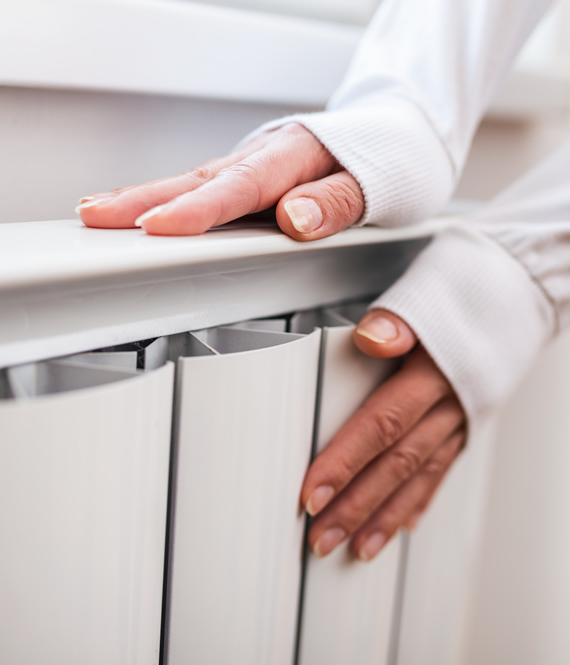
Gas or Electric Heating: Which Is The Best Option?
We recommend helpful products in our articles. Read our full disclosure here. The content on this website is not intended to be a substitute for professional advice, diagnosis, or treatment.
Selecting the most suitable heating system for your home is a significant decision, with so many factors to consider.
For many people, the first decision is whether to go for a gas or electric heating option, with each of those offering its own set of advantages and drawbacks.
But there are other choices to help you keep your home warm and snug.
So, this discussion delves into the pros and cons of gas and electric heating, providing a comprehensive comparison to assist you in making an informed decision.
Then we’ll look at some alternative home heating options that might also meet your preferences and requirements.
Gas Home Heating
Pros
Natural gas is a popular choice for home heating due to its several advantages.
One significant pro is its cost-effectiveness.
In many areas, natural gas tends to be cheaper than electricity, resulting in lower monthly heating bills for homeowners.
Moreover, the availability of natural gas infrastructure is widespread in many regions, making it readily accessible to a large portion of the population.
Gas heating systems are known for their efficiency in providing rapid and consistent heating.
Gas furnaces and boilers connected to a series of radiators can quickly warm up a home and maintain a comfortable temperature, making them particularly suitable for colder climates.
Additionally, the installation time for gas heating systems is relatively short compared to some other options.
They often don’t require extensive modifications to the house, making the installation process smoother and faster.
Cons
Despite its benefits, gas home heating also comes with certain drawbacks.
One significant concern is its environmental impact.
While natural gas is cleaner burning compared to some older heating alternatives like oil, it is still a fossil fuel and releases carbon emissions when burned.
This contributes to global warming and climate change, aligning with the broader effort to reduce carbon footprints.
Safety is another aspect to consider with gas heating.
Gas leaks can be dangerous and pose a significant risk to households.
Adequate ventilation and monitoring systems are necessary to ensure the safety of occupants.
Moreover, the dependency on gas infrastructure limits its viability in regions without access to natural gas pipelines.
Lastly, gas prices can be subject to fluctuations due to market conditions, potentially leading to unpredictable heating costs.
Electric Home Heating
Pros
Electric home heating presents its own set of advantages, starting with efficiency.
Modern electric heating systems, particularly heat pumps, can be highly efficient.
They utilize technology to transfer existing heat rather than generate it, resulting in energy savings.
Safety is also a notable pro for electric systems.
Electric heating systems generally have fewer safety concerns compared to gas counterparts, as they don’t involve combustible fuels or combustion processes within the home.
From an environmental standpoint, electric heating can be more sustainable, especially if the electricity is generated from renewable sources.
As the world shifts towards cleaner energy production, using electric heating powered by renewables contributes to reduced carbon emissions.
Furthermore, electricity is widely available, making electric heating a feasible option in both urban and remote areas.
Electric heating has also moved on from those very ugly panel heaters, with designer electric radiators now being able to provide style as well as warmth.
Cons
The primary drawback of electric home heating is the cost.
Electricity is often more expensive than natural gas in many regions, leading to higher heating bills.
While electric systems are efficient, the higher cost of energy can offset some of the energy savings.
Additionally, certain electric heating systems, like heat pumps, might require more time and effort for installation due to their complexity.
Energy conversion loss is a consideration with electric heating.
Electricity generation and distribution involve energy losses, which can impact overall efficiency.
Moreover, some electric heating methods might take longer to heat up a home compared to gas systems.
This might be a concern in situations where rapid heating is required.
Other Home Heating Options
Heat Pumps
Heat pumps are versatile heating and cooling solutions that extract heat from the outside environment.
Air-source heat pumps pull heat from the air, while ground-source (geothermal) heat pumps extract heat from the ground.
Heat pumps are very efficient as they utilize existing heat rather than generating it.
However, they can have higher upfront costs due to their technology.
Thai form of heating is generally considered to be a very environmentally friendly heating and cooling solution compared to traditional fossil fuel-based systems.
Heat pumps operate by transferring heat from one place to another rather than generating heat by burning fossil fuels.
This approach makes them highly efficient and results in several environmental benefits:
Solar Heating
Solar heating utilizes solar panels to directly generate heat for a home.
It’s a sustainable option that relies on sunlight to produce heat.
Solar heating is considered to be environmentally friendly due to its reliance on renewable energy from the sun and its minimal impact on the environment compared to fossil fuel-based heating systems.
Solar heating systems do not produce greenhouse gas emissions during their operation.
This stands in stark contrast to fossil fuel-based heating systems, which release carbon dioxide (CO2) and other pollutants when burning oil, natural gas, or coal.
Once installed, solar heating has a minimal environmental impact during its operation.
They do not require ongoing fuel consumption or produce harmful emissions, contributing to cleaner air and a healthier environment.
However, it’s important to consider a few factors when evaluating the environmental impact of solar heating systems.
The production of solar heating components requires energy and materials.
While this impact is generally outweighed by the energy savings during the system’s lifespan, it’s essential to choose high-quality components to maximize efficiency and longevity.
Solar heating systems rely on sunlight, so their effectiveness can be influenced by weather conditions.
In regions with limited sunlight, supplemental heating systems might be necessary.
To ensure a consistent heat supply, some solar heating systems might require energy storage solutions, such as batteries or thermal storage tanks.
The environmental impact of these storage technologies should be considered.
Wood or Pellet Stoves
Wood and pellet stoves provide a rustic heating option.
They burn wood or pellets to produce heat, making them cost-effective if a ready supply of wood or pellets is available.
Wood and pellet stoves can be considered environmentally friendly heating options under certain conditions, but they also come with potential drawbacks that need to be carefully evaluated.
Pros
Wood and pellets used in these stoves are typically derived from renewable biomass sources, such as sustainably managed forests or wood waste from other industries.
When burned, wood and pellets release carbon dioxide (CO2) into the atmosphere.
However, this CO2 is part of the natural carbon cycle.
As long as the rate of biomass growth and combustion is balanced, the overall emissions can be considered carbon-neutral, meaning the CO2 released is absorbed by new growth.
Using this form of heating reduces reliance on fossil fuels like oil, coal, or natural gas, which have a higher carbon footprint and contribute to climate change.
You’ll also be able to source wood locally, reducing the environmental impact associated with long-distance fuel transport.
Cons
While wood and pellet stoves can burn cleanly, improper operation or using low-quality fuel can lead to emissions of particulate matter, volatile organic compounds (VOCs), and other pollutants that can degrade air quality and pose health risks.
Then there is the potential for unsustainable logging practices can lead to deforestation and habitat disruption, which can negatively affect ecosystems and biodiversity.
While carbon emissions from burning wood are part of the natural cycle, burning large amounts of wood or pellets can release more CO2 than is absorbed by regrowth in the short term, contributing to localized air pollution and climate change.
Our Conclusion
In conclusion, the decision between gas and electric heating hinges on multiple factors, including cost, efficiency, environmental impact, and regional availability.
It’s important to evaluate these factors based on your individual circumstances and preferences.
So don’t assume that gas and electricity are your only options; exploring alternative heating options can reveal solutions that align more closely with your energy goals and requirements.
"We love to research problems, examine studies, analyze solutions, and share with you ideas that make life healthier. You can learn about us and our editorial standards here. Have suggestions or feedback to share? Send us a message!."













Leave a Comment